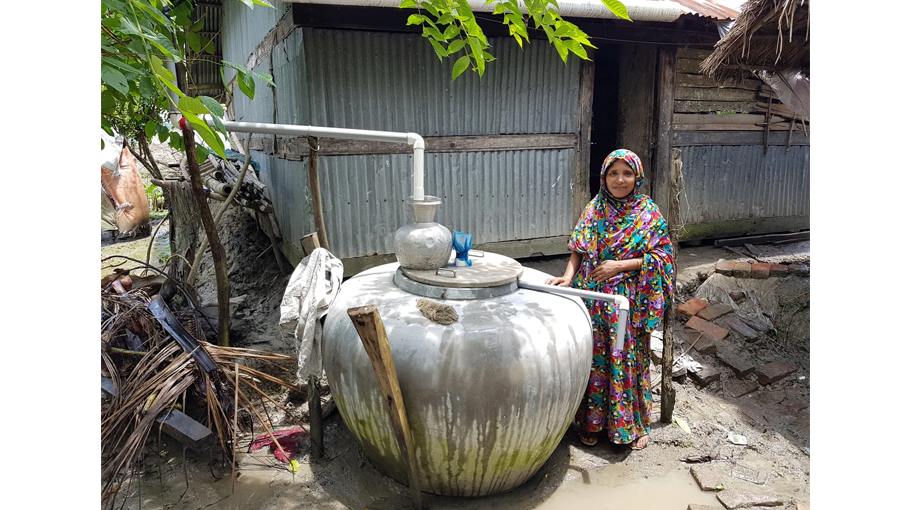Move to conserve rainwater in coastal belt

The government has undertaken an initiative to conserve rain water in 222 unions of 44 upazilas of 10 coastal districts of the country.
To this end, a project titled “Water supply through conservation of rain water in coastal districts” has been proposed in the Planning Commission.
The total cost for its implementation will be Tk 961.75 crore. If the project is implemented, rain water will be conserved in the coastal areas due to increase in salinity-arsenic contamination and so on in the coastal areas of the country.
This water will be supplied to the residents of the project area.
About the main objective of the project, it has been said that under the project 206,872 rain water harvesting infinites (conservator) will be constructed.
Besides, the coverage of self-managed water supply in the project areas will be increased to 60.1 percent by 2030.
A Planning Commission official said that the PEC (Project Evaluation Committee) meeting was held on February 13, 2020 to receive proposals from the local government department.
The project has been recommended to be presented at the meeting of the Executive Committee of the National Economic Council (ECNEC) as it complied with the recommendations given at the meeting, he mentioned.
If approved, it will be implemented by June 2024 by the Department of Public Health Engineering, he added.
Mamun-al-Rashid, member (secretary) of the Physical Infrastructure Division of the Planning Commission in charge of the project, said that if the project is implemented, it will be possible to supply salinity and arsenic-free pure water to the locals by conserving rainwater in 222 unions of 44 upazilas of 10 coastal districts.
This will increase the safe water supply in the coastal areas, he added.
The project proposal states that the main victims of climate change are the coastal areas of the country.
As a result, sea level rise, storms, tidal surges and other natural disasters cause salinity to spread not only on the surface but also on the groundwater table.
It has also been observed in some areas that no source of potable water has been found there.
Even river, canal, beel and pond water is not free from salinity, and the salinity increases during the dry season.
Drinking water from all these water sources cannot be used for household purposes.
Due to the lack of fresh water, the residents of the area are forced to drink this salty water and suffer from high blood pressure, various complications during pregnancy in women, kidney disease and skin diseases.
The project has been taken up in 10 out of 19 coastal districts of the country.
The acceptable level of salinity in drinking water is 500 ppm, while in some coastal areas of the country the amount is almost two to three times higher.
Freshwater sources are scarce in many coastal regions so water has to be collected from far away sources.
Therefore, initiatives have been taken to use rain water in all these areas.
These areas which are prone to salinity, will be able to make up the lack of potable water. This technology for storing rainwater is very old.
This is a very popular method not only in Bangladesh but also in many countries of the world which are prone to salinity or lack of potable water.
Where there is an abundance of rain, the residents store this rainwater for a certain period of the year which they can use later.
The proposal further said that a total of 5,950 rainwater harvesting systems have been set up under the recently completed project titled “Safe Water Supply in Rural Areas of Khulna, Bagerhat and Satkhira Districts”.
Installed rainwater harvesting systems are in operation and good quality.
The project will be implemented in the under following coastal regions of the country.
In 44 upazilas in 10 coastal districts of the country, Tungipara, Gopalganj Sadar, Kotalipara, Kashiani, Muksudpur upazilas of Gopalganj district.
In Koira, Dumuria, Terkhada, Dakop, Paikgachha, Batiaghata and Rupsha upazilas of Khulna district.
In Kuchua, Chitalmari, Mongla, Morelganj, Rampal and Sharankhola upazilas of Bagerhat district.
In Asashuni, Kalaroa, Kaliganj, Tala, Debhata, Shyamnagar and Satkhira Sadar upazilas of Satkhira district.
In Barguna Sadar, Patharghata and Bamna upazilas of Barguna district.
In Nazirpur, Pirojpur Sadar, Bhandaria, Mathbaria and Indurkani upazilas of Pirojpur district.
In Kanthalia, Nalchiti and Rajapur upazilas of Jhalokati district.
In Kalapara upazila of Patuakhali district. Anwara, Sitakunda and Sadwip upazilas of Chittagong district and in Sadar, Kutubdia, Maheshkhali and Teshnaf upazilas of Cox's Bazar district.





